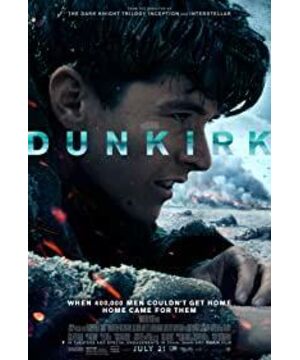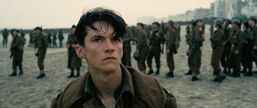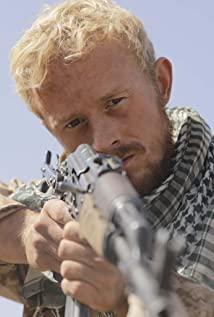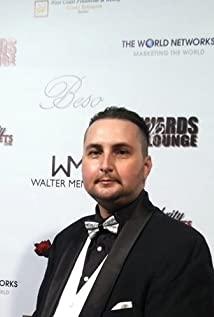As Robert McKee said: Originality is the fusion of content and form - content (scenarios, characters, ideas) and form (selection and arrangement of events) complement, complement and influence each other. With content in one hand and form in the other, writers can craft stories. The shape of the story reshapes itself as you scrutinize the material of the story. When you replay the form of the story, the spirits of reason and emotion will also emerge one by one. Director Nolan seems to have become a sign - people who don't know him well - through media reports, social media dissemination, and film critics' recommendation series related to Dunkirk movie promotion, this is naturally left in mind. The impression of a director who is good at controlling structure. Non-linear narrative, a term that is not difficult to understand, is also familiar. Friends who came to "worship" the great god with a curiosity, this movie may disappoint you - in my opinion, this time Dunkirk has a low threshold in terms of structure, and belongs to a more "friendly" Narrative is a non-linear narrative group movie that belongs to the "true subset" of three-line parallel time - for the theme of war, I think it is quite suitable. And when it comes to the war factor, Dunkirk obviously simplified the war - except for the flash of the German soldier's face when Farrell (Tom Hardy) was captured at the end - in the very beginning of the war zone , the submarine threw torpedoes under the water, the BF-109 fighter was in the air, and no shots were given to the enemy. As far as war films are concerned, Dunkirk only talks about escape - starting from the individual means restrained handling. There are no scenes of blood and blood flying; there are no close-ups of real swords and guns; the fighter jets drop cannonballs, the difference is whether the people who are lying down stand up again; the people struggling to survive shouting "Help! Help!"; The living gently pushed away the corpses that were drifting with the waves... The "invisible" enemy turned into a potential danger all the time, blending into the viewing atmosphere - the sound effects and cries for help in the background - the structure of Dunkirk passed through The way of cutting emotions amplifies the concept of "everytime" and mobilizes emotions. I mentioned earlier that Dunkirk started from individuals, and there were no famous people. Some were just people in the collective who were eager to survive. It was said that they were individuals. Nolan did not focus on describing the characteristics of these individuals—character, background. , the main characters in the so-called three lines are actually responsible for the tasks from the perspective of the people. They are actually individuals who have been endowed with some group commonality. Before I talk about the plot, let me put some details on the timeline: The first line The Mole The time span is one week (the first line can also be divided into a bright line and a dark line; the dark line is the perspective of Borton played by Kenneth Branagh, the split Admiral), the second line The Sea time span is one day , the third line The Air has a time span of one hour; in the first line that opens first, we initially see from Tommy's point of view the threat posed by German bombers from time to time - precisely because it is only from an individual From the perspective, we clearly understand the reasonable existence of the misunderstanding between the characters in the first line and the Air Force in the third line at the end, where the Army expresses a blaming attitude towards Air Force Collins, who also successfully retreated: "You Air Force fuck What are you doing?", Collins himself would say: "I let you down." - The advantages of multi-line parallelism are even more prominent: only the "God's perspective" viewers - experience the sea, land and air at the same time. The thrilling moment we can realize that Collins heard the old captain Dawson say: "Everyone on the boat knows what you have done." Historical facts have proved that these successfully retreated Royal Air Forces have indeed made great contributions afterward. Before talking about the second line, I want to talk about the third line, the third line, The Air. At the beginning, Farrier had two comrades in the main perspective - Captain Fortis and Fortis No. 2, the first round Not long after the battle, the leader of Fortis was unfortunately shot down, and Farrier's fuel gauge was also damaged due to the unfortunate hit. Through his comrade Collins, Farrier recorded the approximate fuel reserve with chalk: 70 gallons, and he also recorded the fuel gauge of Farrier. Time 14 of the Tees long plane crash: 55. After a few rounds of tacit cooperation, Collins was hit and needed to make an emergency landing: "Good luck, Collins...Collins?" Careful friends may find that in the rescue part of Collins in the middle and rear part of the second line, we can hear again: "Good luck, Collins... Collins?" Only this time, the director continued Collins' perspective for us, Collins, who was trapped in the engine room and could not escape, was rescued by the "Moonstone" - and at this time, we still don't know why the old captain Dawson, who had always been calm in the early stage of the second line, risked the explosion of the fighter plane. Keep repeating: no parachute was seen, no seat popped up, the pilot may be dead... Still insisting on asking the younger son Peter to save the life - later in the plot, the background of the old captain is also filled in, his eldest son ——Peter's brother was an air force who died in the First World War. Combined with the old captain's muttering when he directed his younger son to carry out rescue operations: "Maybe? Maybe...he is still alive...", when this obsession is true Rescue a nearly missed Air Force Collins, the old captain's heart has been redeemed in a sense; after time, from Farrier's perspective, we can see that an enemy plane sank a large warship, "Moonstone" The ship was also nearby, and could not let the enemy planes rage, and successfully shot down the enemy planes. The people on the large warships abandoned the boat. At this time, Tommy, who had just escaped from the trawler, was swimming towards the boat, but he could only watch the struggle to escape. The people "wrapped" in the oil leaked from the warship swam to themselves. After the downed enemy plane collided with the warship, the oil leaked immediately ignited the fire. Those who didn't swim fast enough had to be buried in the fire (this probably It is the largest part of Dunkirk without a bloody scene), and the "Moonstone" passed through here and rescued the people who were struggling to escape in this water (the impact of the sound of shells in the water on the eardrum, the raging fire, the sense of despair). People, a soldier got on the ship and refused to let go of the hand of a comrade who was still burnt and motionless - here is the place where the three lines meet, the last day of the week, the second half of the day, the middle of an hour
"It's awe-inspiring, but I personally think that it's not enough to have such a large emotion in one role, and because of this, I think there is room for improvement in Dunkirk - about the French compatriots. Let's talk about the plot. The opening scene is a few British soldiers in the war zone. The opening scene of several close-ups is also a widely used method, picking up cigarette butts, drinking water, and solving internal emergencies. Suddenly gunshots sounded, and one by one fell down. , preliminarily established the first line - the main point of view of The Mole | a week - we don't know when he will actually solve the intimidating soldier Tommy, who kept shouting "I'm English" to relieve the French allies The danger of accidental injury (there is no ignoring the possibility of accidental injury, and the details of assembling the guns without success after a long time of panic, let the viewer know from the beginning, the director has considered it very comprehensively), when I came to the beach, when the camera turned, it was a row A long line of soldiers were waiting. When Tommy was looking for a place to continue his unsolved business, he met Gibson, played by Aneuryn Barnard, who was burying a body, and silently came to help. No Dialogue, but tacit approval of each other, seeing the wounded, full of tacit understanding to find a stretcher, wanting to get on the boat to rescue the wounded, with the trot all the way, the rapid drum beat in the background synchronized with the footsteps, as if he was Tommy— —Insert a detail of a shot transition at this time (for the main point, only one detail is inserted here): The bridge where the army waiting in line is located is next to a row of guns, and the second line The Sea | The shot at this time on a day is full of life jackets - the ship is about to go away, the dilapidated and narrow wooden boards connect the bridge and the ship, when Tommy hesitates, the people around him shout: "Come and try! ”, after successfully crossing over, everyone around them said from their hearts, “Hurray! "(warm heart); yet Tommy and Gibson were unable to escape on the boat and were driven down. The wily Gibson hid under the bridge and beckoned Tommy to join him in order to sneak on to the next boat. However, that boat The rescue boat didn't get far before it was sunk - the Red Cross was not spared either; the AA soldiers on board had to jump off the boat; at this point, Tommy and Gibson under the bridge rescued the AA regiment Alex - by One Direction's Harry Styles. Following Alex, the three of them got on the second boat - exposing their French identity in order to avoid conversation (although it is said to be arm-in-arm, but still...), as for the high vigilance of being shelled, it is hard to say this. Is it subjective or a side benefit, Gibson didn't choose to go inside the ship and stay on the deck; inside the ship, Tommy, the main character, has the first real dialogue since the beginning of the film, and Alex asks Tommy: "That friend of yours. What about (Gibson)", Tommy thought for a while and said, "He's looking for a quick exit." At this point, for the first time, Alex raised the audience's inner doubt: "Why don't you and your friend talk?" , The big ship was hit by a torpedo, and the water poured in quickly. Gibson on the deck first opened the cabin door before diving to survive. Tommy and Alex escaped because of the timing problem. On a small boat, the people on the boat refused Tommy and Alex to get on the boat because it was full, so Gibson secretly put a rope and pulled Alex and Tommy ashore. The three were watching from the shore and joined another artillery regiment, they found a stranded trawler, and at this time there was a conversation about high tide - how to tell whether the tide is high or not - when body's come back (when the body is washed ashore time), there is a scene where the soldiers on the beach gently push away the corpse pushed by the rising tide; Tommy and his party got into the boat and waited for the rising tide - "Someone should stick his head out to see if the water is rising," one person said, No one dared, so the man went on to say: "You cowards who just talk and don't do it" but he didn't stick his head out himself - after a while, they "caught" the Dutch captain of the trawler; the enemy found They got off the boat and started shooting - the first three bullets went in and everyone panicked and Tommy tried to reassure everyone by saying, "Look at those bullet holes - they're just shooting practice. High tide, the boat didn't float due to weight issues, water started pouring in, more gunshots came as people panicked to plug the bullet holes - some of these people had to get off the boat to keep the boat afloat Alex first stated that Gibson had never spoken, and he must not speak English. It might be a German spy who asked Gibson to disembark, while Tommy, who was also in distress, defended Gibson. In the confusion, Gibson had to confess: "I'm French ! A French frog." (deprecating himself - French frog) The dialogue at this point touches on the paradox of human nature in a desperate situation - "He must get off the boat, and you're next! "Alex said to Tommy, who was maintaining Gibson. "I just want to go home. But I think you are wrong. "Obviously, Tommy also fell into contemplation, "Fear,guity,fate" - this is human nature, this is what it is , There are many masterpieces of disasters, wars, and secret rooms under this proposition, I will not repeat them - the captain started the engine, the bullet holes were still increasing, the soldiers did not care about the disputes, and desperately blocking the bullet holes did not help. So he had to abandon the ship again. Gibson could not understand English and was still blocking the bullet holes. Alex, who had just proposed to let Gibson disembark the ship, reminded Gibson that he was about to abandon the ship. Unfortunately, he was accidentally caught in the chain and drowned in the bullet-scarred boat. Among the fishing boats - it's very uncomfortable here, people who thought they could survive the ordeal were killed here. This is the intersection of three lines - the third line The Air | a hour was hit The German bomber crashed into the sea and caused another large ship to leak oil, and the sea ignited a fire. The people who escaped on the large ship and Tommy and his party were rescued by Captain Dawson and others played by Mark Rylance of Second Line. I returned to the motherland that night and got on the train. I will send some first, and I will continue to add more later.
View more about Dunkirk reviews











